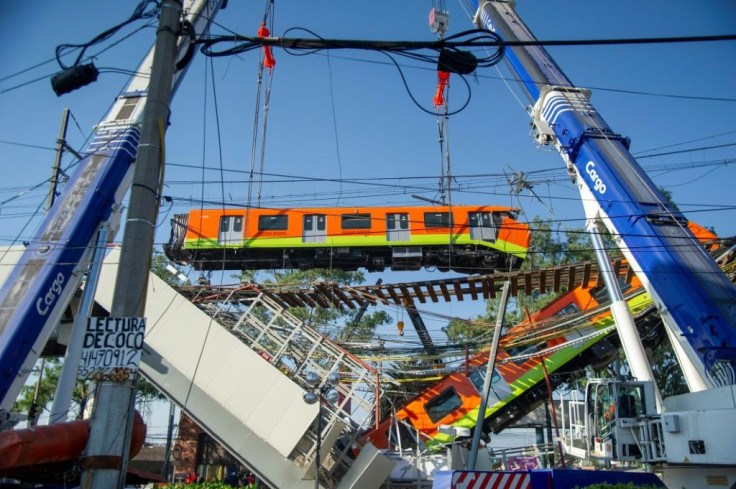Mexico City 'Golden Line' Under Suspicion After Crash
The Mexico City metro line at the center of one of the network's worst ever accidents has been plagued by a series of problems since it opened nearly a decade ago.
Line 12, also known as the Golden Line, was built at a cost of 26 billion pesos ($1.29 billion at today's exchange rate).
It runs for 24.5 kilometers (15 miles) connecting the west and the east of the capital, at times on elevated tracks.
The metro line, the city's newest, was inaugurated on October 30, 2012 by then city mayor Marcelo Ebrard, who is now Mexico's foreign minister.
Ebrard is seen as a likely ruling party candidate for the 2024 presidential election, but Monday's accident, in which at least 23 people died, could stymie his ambitions.
After the line's launch, wear and tear was detected on the track and train wheels, forcing Ebrard's successor as mayor, Miguel Angel Mancera, to suspend services at a dozen stations.
A study later concluded that there were problems with the design, operation and maintenance of the track.
In 2015, appearing before a congressional investigative commission, Ebrard sought to dissociate himself from the problems.
After Monday's accident, in which a section of elevated track collapsed and carriages plunged towards the ground, Ebrard said he was ready to cooperate with investigators.
"For my part, I put myself at the full disposal of the authorities," he said.

"I understand that there are many motivations of a political nature," Ebrard added.
Mexico City Mayor Claudia Sheinbaum said the accident was caused by the rupture of a beam in the overpass.
"Citizens have the right to know the truth," said Sheinbaum, who is also seen as a ruling party contender for the 2024 presidential vote.
The woes afflicting Line 12 continued after a 7.1-magnitude earthquake hit Mexico on September 19, 2017, toppling buildings and leaving 370 dead and more than 7,000 injured, mainly in the capital.
Six stations were affected and closed.
Fernando Espino, leader of the subway workers union, told the Milenio television channel on Tuesday that engineers had already reported failures on the line on various occasions.
"It could have been negligence. They didn't take it seriously," he added, noting that unlike other metro lines number 12 is maintained by an external firm.
Sheinbaum assured Mexicans that maintenance checks are carried out on Line 12 every day, cautioning against "speculation."
In January 2018, the metro said it had reinforced the structure of the line.
"Prioritizing the safety of users was the main objective of the works carried out," it said in a statement at the time.





















